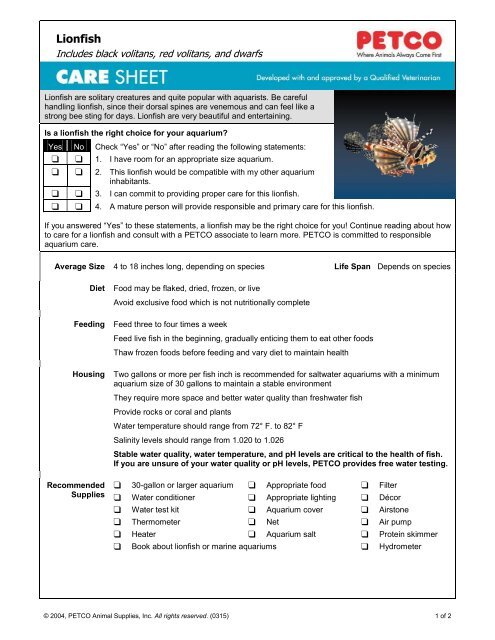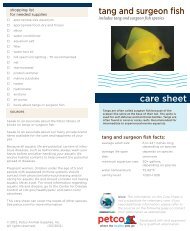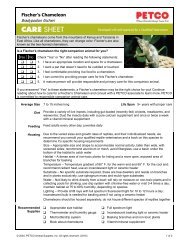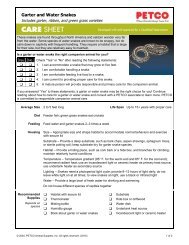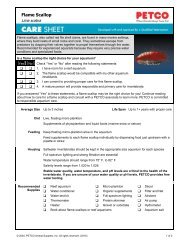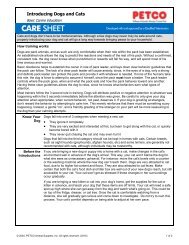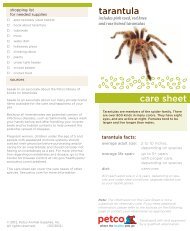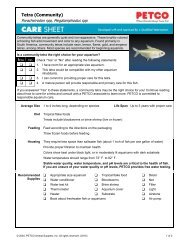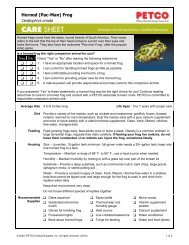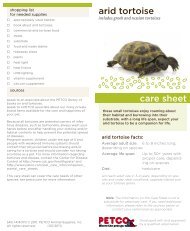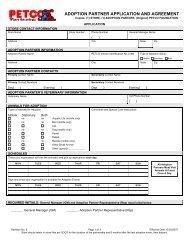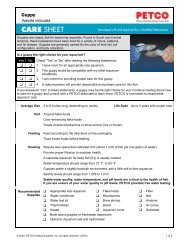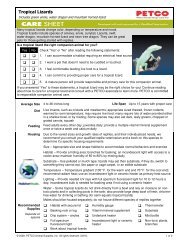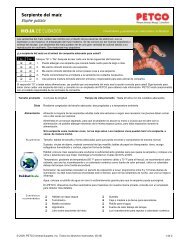You also want an ePaper? Increase the reach of your titles
YUMPU automatically turns print PDFs into web optimized ePapers that Google loves.
<strong>Lionfish</strong><br />
Includes black volitans, red volitans, and dwarfs<br />
<strong>Lionfish</strong> are solitary creatures and quite popular with aquarists. Be careful<br />
handling lionfish, since their dorsal spines are venemous and can feel like a<br />
strong bee sting for days. <strong>Lionfish</strong> are very beautiful and entertaining.<br />
Is a lionfish the right choice for your aquarium?<br />
Yes No Check “Yes” or “No” after reading the following statements:<br />
❑ ❑ 1. I have room for an appropriate size aquarium.<br />
❑ ❑ 2. This lionfish would be compatible with my other aquarium<br />
inhabitants.<br />
❑ ❑ 3. I can commit to providing proper care for this lionfish.<br />
❑ ❑ 4. A mature person will provide responsible and primary care for this lionfish.<br />
If you answered “Yes” to these statements, a lionfish may be the right choice for you! Continue reading about how<br />
to care for a lionfish and consult with a PETCO associate to learn more. PETCO is committed to responsible<br />
aquarium care.<br />
Average Size 4 to 18 inches long, depending on species Life Span Depends on species<br />
Diet<br />
Food may be flaked, dried, frozen, or live<br />
Avoid exclusive food which is not nutritionally complete<br />
Feeding<br />
Feed three to four times a week<br />
Feed live fish in the beginning, gradually enticing them to eat other foods<br />
Thaw frozen foods before feeding and vary diet to maintain health<br />
Housing<br />
Two gallons or more per fish inch is recommended for saltwater aquariums with a minimum<br />
aquarium size of 30 gallons to maintain a stable environment<br />
They require more space and better water quality than freshwater fish<br />
Provide rocks or coral and plants<br />
Water temperature should range from 72° F. to 82° F<br />
Salinity levels should range from 1.020 to 1.026<br />
Stable water quality, water temperature, and pH levels are critical to the health of fish.<br />
If you are unsure of your water quality or pH levels, PETCO provides free water testing.<br />
Recommended<br />
Supplies<br />
❑ 30-gallon or larger aquarium ❑ Appropriate food ❑ Filter<br />
❑ Water conditioner ❑ Appropriate lighting ❑ Décor<br />
❑ Water test kit ❑ Aquarium cover ❑ Airstone<br />
❑ Thermometer ❑ Net ❑ Air pump<br />
❑ Heater ❑ Aquarium salt ❑ Protein skimmer<br />
❑ Book about lionfish or marine aquariums ❑ Hydrometer<br />
© 2004, PETCO Animal Supplies, Inc. All rights reserved. (0315) 1 of 2
<strong>Lionfish</strong><br />
Includes black volitans, red volitans, and dwarfs<br />
Characteristics<br />
Habitat<br />
Maintenance<br />
Compatibility<br />
Signs of a<br />
Healthy Fish<br />
Common<br />
Health Issues<br />
Mostly solitary, not a very active swimmer<br />
<strong>Lionfish</strong> attack their meal in one swift motion<br />
Handle carefully: dorsal spines are venomous and can feel like a strong bee sting; although<br />
most people are not affected by lionfish stings some humans may be allergic to the venom<br />
Check filter, other equipment and water temperature daily<br />
Check water quality at least once a week and salinity levels at least twice a week<br />
Change 10–25% of the total volume of water every two to four weeks, or as needed<br />
Introduce new fish to the aquarium gradually<br />
Compatible with fish of similar or larger size; will eat smaller fish<br />
Clear eyes Healthy appetite<br />
Swims slowly Clean in appearance<br />
Bright, even coloring<br />
Health Issue (alpha) Symptoms or Causes Suggested Action<br />
Fin Rot<br />
Marine Ich<br />
Frayed or disintegrating fins;<br />
the base of the fins usually<br />
reddens<br />
Cysts on fins, gills, and skin;<br />
fasting; cloudy eyes; labored<br />
breathing; excess skin<br />
mucus; or pale skin<br />
Improve water quality; commercial<br />
antibiotics may be effective<br />
Treat entire aquarium with a<br />
commercial parasite remedy and<br />
improve water quality; freshwater<br />
dips can dislodge the parasites<br />
Signs of Illness<br />
Preventing<br />
Common<br />
Health Issues<br />
Sources<br />
Loss of color Spots or fungus on body or mouth<br />
Erratic swimming Labored breathing<br />
If you notice any of these signs, test water quality and improve as necessary.<br />
Avoid crowded conditions; they are a major cause of stress and disease<br />
Maintain good water quality with regular water changes and adequate filtration<br />
Marine Fishes by Scott W. Michael<br />
Saltwater Aquariums for Dummies by Gregory Skomal<br />
The New Marine Aquarium by Michael S. Paletta<br />
Note: The information on this Care Sheet is not a substitute for veterinary care. If you need additional<br />
information, please refer to the above sources or contact your veterinarian as appropriate.<br />
2 of 2 SKU 926930 © 2004, PETCO Animal Supplies, Inc. All rights reserved. (0315)


